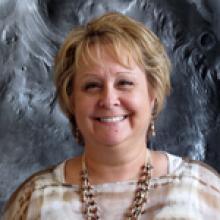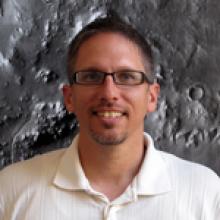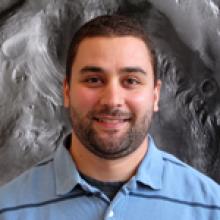Sheri Klug BoonstraDirector, ASU Mars Education Program
Sheri Klug Boonstra has worked for over a decade as the Director of the ASU Mars Education Program within the Mars Space Flight Facility, School of Earth and Space Exploration at Arizona State University. Ms. Klug Boonstra is the formal education lead for the Mars Public Engagement Team at Jet Propulsion Laboratory in Pasadena, CA. The ASU Mars Education Program at Arizona State University, in collaboration with JPL, leads the formal education outreach efforts to K-16 teachers and students for all NASA’s missions to Mars.
The ASU Mars Education Program has provided hands-on, inquiry-based Mars workshops for K-16 in-service and pre-service educators across the United States, developed experiential research programs for students – Mars Student Imaging Project (MSIP) and Mars Exploration Student Data Teams (MESDT), created and coordinated Earth/Mars-related national field trips for teachers. Her program has emphasized classroom and educator connectivity with Mars scientists and engineers. Ms. Klug Boonstra has been involved with NASA from 1995 - 2011. Ms. Klug Boonstra has participated in numerous national Mars-related public outreach events including Mars mission launch conferences, Mars Day at the Smithsonian National Air and Space Museum in Washington, D.C. and National Space Day.
Ms. Klug Boonstra serves as the Education and Public Outreach Lead for the ASU Lunar Reconnaissance Camera Program and the ASU NASA Astrobiology Institute Team. She currently also serves on the NASA Headquarters Science Mission Directorate - Science Education and Public Outreach Forum as the Planetary K-12 Representative. Ms. Klug Boonstra is on the Advisory Council for Space Center Houston – the Official Visitor Center for NASA’s Johnson Space Center.
From 2008 to 2010, Sheri Klug Boonstra was the USRA Director and NASA Project Administrator of the NASA Undergraduate Student Research Program (USRP) located at NASA Johnson Space Center in Houston, TX. As such, she managed a distributed national team that annually placed over 345 competitively selected undergraduate science, technology, engineering, and math (STEM) interns at 10 NASA Centers and 2 NASA Research Centers. She was the USRA lead for building and promoting connectivity between NASA national education projects (pre-college and higher education) and USRP to strengthen NASA pipeline, provide educational guidance to align USRP with the university community's needs while meeting NASA's goals of a STEM workforce goals. She was involved in planning and conducting reviews of educational research and overseeing the USRP project evaluation for NASA.
Ms. Klug Boonstra served as the Education and Public Outreach representative on the Solar System Exploration Subcommittee for NASA Headquarters for 3 years and was a member of the Lunar and Planetary Institute Science Council for the Universities Space Research Association for 3 years. As a NASA Principal Investigator, she has been awarded over $30 million dollars in grant money for education programs. She has a Bachelor of Science and Masters Degree in Earth Science Education, was a Space Grant Fellow, was awarded Geology Student of the Year and has been a K-12 science and gifted education teacher. Ms. Klug Boonstra has earned 4 NASA Group Achievement awards and numerous awards from other national and state entities.
|
Leon ManfrediInstructor, On-site Mars Student Imaging Project (MSIP)
Leon Manfredi is a planetary geologist and the on-site Mars Student Imaging Project (MSIP) instructor for the Mars Education Program at Arizona State University and brings many great talents to MSIP.
Leon graduated from Southwest Missouri State University in 1998 with a
B.S. in Computer Information Systems. After working for Motorola as a software developer for eight years, he returned to school to follow his true passion - geology. Leon received his B.S. in Earth and Space Exploration from Arizona State University in 2010. During that time, he participated in the NASA Space Grant program and had the honor of working with a true giant in planetary sciences, Dr. Ron Greeley.
Leon studied wind features and volcanoes on Mars. As an undergraduate student, Leon became active in many education and public outreach events and realized he enjoyed educating people about planetary geology. He brings his enthusiasm and his planetary geology expertise to the classroom to help the MSIP students and teachers have successful learning experiences. Leon has a M.S. in Geological Sciences where his thesis work focused on determining the volcanic history of the Tempe Volcanic Province on Mars.
|
Jessica SwannCurriculum and Technology Specialist
Jessica Swann is the curriculum and technology education specialist and MSIP distance learning coordinator for the ASU Mars Education Program located in the Mars Space Flight Facility at Arizona State University. Jessica is responsible for developing Mars STEM curriculum and facilitating K-12 STEM teacher professional development nationally.
Jessica received her B.S. degree in Science Education from Wright State University in 1999 and M.Ed. in Educational Technology through Grand Canyon University in 2006. She taught 9th grade science for 3 years in Ohio, and then 6 years in Peoria, where she facilitated inquiry learning and used the Mars Student Imaging Project with her students.
Currently, Jessica aspires to work toward her Ph.D. in Science Education and in her spare times spends time camping and watching her family rock climb throughout Arizona, California, and Utah.
Jessica's goal in Mars Education is to provide a bridge of authentic opportunities and experiences to teachers (both pre-service and in-service) and students in the field of science. Her passion is building a scientific literate community where citizens are equipped with a sound understanding of how science works and how to discern high quality, accurate information from those resources that inaccurately portray scientific research. She considers the Partnership for 21st Century Skills to be the single most important guiding philosophy in science education to date.
|
Anthony ZippayManager, Education Strategies and Communication
Anthony Zippay is the Manager of Education Strategies and Communications for the Mars Education Program at Arizona State University.
Mr. Zippay comes to ASU from the Universities Space Research Association where he worked as the Principal Investigator and Project Manager of the NASA Undergraduate Student Research Program, one of NASA’s largest national higher education projects. In his role with USRP he led the program to tremendous growth through a comprehensive strategic communications plan, resulting in exponential increase to the applicant pool as well as the participation of the program. USRP later received a NASA Group Achievement Award in 2010 for Management Excellence.
Anthony graduated from Bowling Green State University with a B.A. in Communications and Marketing. His background involves working as a marketing research executive for Insight Advertising and a corporate account executive for the University of Texas Pan-American, thus he brings a unique perspective to NASA education programs. He has successfully managed major advances in enhancing the nation’s STEM workforce through experiential education. Anthony has implemented and designed new approaches to education program strategy among NASA projects through the use of new multimedia applications and web based tools for the purposes of student outreach and public engagement within NASA opportunities and professional development experiences. Anthony has a passion for research both in marketing and education and is dedicated to finding unique solutions that solve problems and have true and positive impact within the STEM education pipeline.
|
